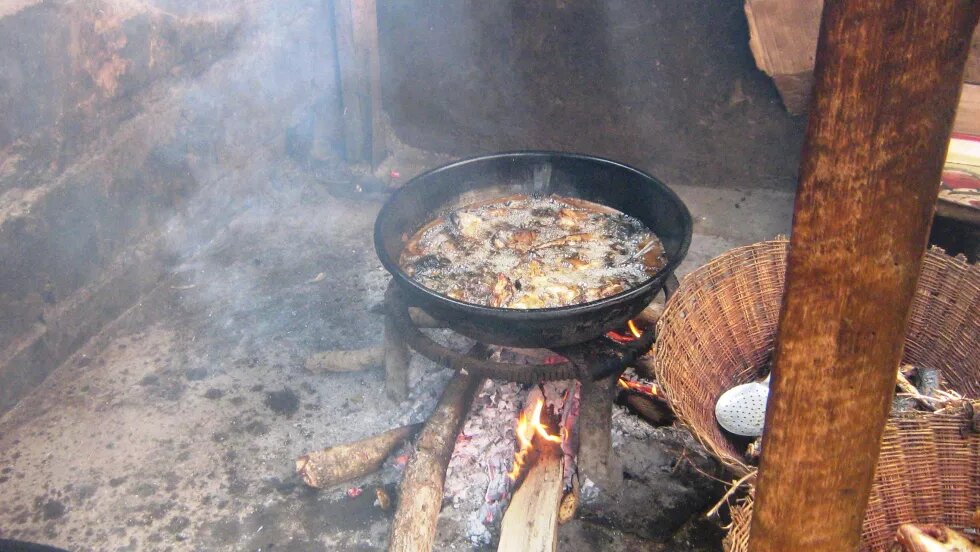
A few months ago, I visited Makode community in Kano State to see firsthand how the people of the desert were fighting against the advancing sand dunes to save their farmland and their wells by planting a wall of trees. The irony is that, most of the trees would be chopped down by the same people who planted them as they search for firewood, their only source of energy.
Zoom forward to last week, in a room with twenty journalists from all across Nigeria, who were listening to the director of the Development Association for Renewable Energies, DARE. Yahaya Ahmed was there to explain the enormous extent of the Nigerian climate crisis and showed pictures of climate refugees migrating in search of livelihood, of illegal logging of forests that should otherwise be carbon sinks and wind breakers, of women walking long distances in search of fire wood, of trucks moving wood from Southern Nigeria to the North and of women cooking in smoky kitchens with their babies strapped to their backs.
The room became quiet. Many journalists had never seen our country in this way. As I looked at Yahaya’s photos, the faces had the same deep, dry wrinkles as those I had met in Makode. It’s the same story of pain: The story of people fighting for their very existence. The Nigerian Alliance for Clean Cook Stoves was launched on 20 March 2012, with the aim of distributing ten million clean cook stoves across Nigeria by 2020 and thus slowing down deforestation by reducing the amount of wood needed for cooking. According to Ewah Eleri, the director of the International Centre for Energy Environment and Development (ICEED), the Alliance is a public-private initiative to save lives, improve livelihoods, empower women and combat climate change by creating a thriving market for clean and efficient household cooking solutions. “The Alliance is working on reducing and avoiding the use of wood for cooking. We are not promoting any particular brand of cook stove, but we want to scale up the market for many different stoves.” ICEED is hosting the Alliance in Nigeria.
Millions of Nigerian households cook with wood fuel and if nothing is done, Nigeria’s remaining forests will be gone within about ten years. Smoke from indoor air pollution contributes to 95,000 deaths in Nigeria every year. In the past, I have spoken to many Nigerian women who use the traditional three stone fire and they have shared their experiences with me. Women like Christiana, a food vendor in Abuja says “I dey experience difficulty when I dey breath and I too dey cough”. So what are the chances that Nigerian women will soon cook in a cleaner way? Whilst Ron Bills of Envirofit, a US based producer of clean cook stoves says that his company aims to open a factory in Nigeria, Radha Muthiah, executive director of the Global Alliance for Clean Cook Stoves, listed what government needs to do at national level in order to facilitate rapid market growth:
- Tax and other incentives for production and sale of stoves
- Enabling Nigerian manufacturers and social enterprises to learn from successful business models elsewhere
- Integration of cook stove component with other national programmes such as health or gender programmes.
Muthiah added that the risks posed by high-pollution cooking should be accorded similar attention as diseases such as malaria, HIV/AIDS and tuberculosis. "We feel the time is right and the time is indeed now with the launch of the Nigerian Alliance to arrest this silent killer in homes of half of the world’s population." As a run up to the launch, hbs and ICEED organized a live cooking demonstration for the Nigerian media. Nigerian movie star Ejike Asiegbu was on hand to assist with the cooking.
The journalists watched the clean cooking method that uses 60 to 80 per cent less wood, eliminates excess smoke and cooks faster. Tina Armstrong-Ogbonna, an environmental journalist with the Federal Radio Corporation says “This is a welcome development in reducing diseases related to indoor air pollution and also deforestation in Northern Nigeria. From the demonstration and presentations, I believe the grassroot is one group of people that must be carried along in ensuring the success of the campaign. The campaign would also help Nigeria achieve the Millennium Development Goals of women empowerment, improving maternal health and also sustainable development as women are the primary users".
The message is being spread as wide as it can get. The message that says “one more Nigerian woman should not die from cooking”, “One more child should not die of starvation or thirst because of the encroaching desert”, “One more community should not migrate leaving their history, tradition and culture in search of food and water”.
click here for a picture of the stove More information on the Nigerian Alliance for Clean Cookstoves